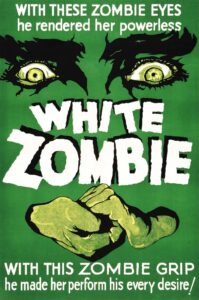Movie Review: “White Zombie” (1932)
Rating: ★★★☆☆
“White Zombie,” released in 1932, is a seminal work in the horror genre, often credited as the first feature-length zombie film. Directed by Victor Halperin and starring the enigmatic Bela Lugosi, the film is a fascinating blend of voodoo mysticism, psychological horror, and melodrama.

Plot Summary
The story revolves around a young couple, Madeleine and Neil, who travel to Haiti for their wedding. They encounter ‘Murder’ Legendre, played by Lugosi, a nefarious voodoo master who uses zombies as his personal slaves. Legendre becomes infatuated with Madeleine and uses his dark powers to turn her into a zombie. The film delves into themes of love, obsession, and the unsettling fear of losing one’s identity.
As Neil grapples with the loss of Madeleine, he seeks the help of Dr. Bruner, a missionary familiar with Haitian voodoo practices. Together, they embark on a perilous journey to Legendre’s fortress, navigating through a landscape filled with the living dead. The film takes a suspenseful turn as they attempt to rescue Madeleine, culminating in a confrontation that tests the limits of love and sacrifice.
The climax of the film offers a poetic justice of sorts, as Legendre’s own creations turn against him. The ending leaves viewers with a sense of both relief and melancholy, questioning the morality of using dark forces to manipulate human will. It’s a haunting conclusion that elevates “White Zombie” from a mere horror flick to a thought-provoking exploration of human vulnerability and the complexities of good and evil.
Performances
Bela Lugosi’s portrayal of Legendre is the highlight of the film. His chilling performance, accentuated by his piercing eyes and menacing demeanor, adds depth to an otherwise straightforward villain. The supporting cast, however, leaves much to be desired, often falling into the trap of overacting, which was not uncommon in early sound films.
Bela Lugosi’s performance as ‘Murder’ Legendre is not just a highlight of the film but also a defining moment in his career. Coming off the success of “Dracula” (1931), Lugosi further solidified his place as a horror icon with “White Zombie.” His nuanced portrayal goes beyond mere villainy; he brings a certain gravitas and complexity to Legendre, making him both captivating and repulsive. His ability to command the screen with just a glance or a subtle gesture showcases his mastery of the craft. It’s a performance that has stood the test of time and continues to be studied and admired by actors and filmmakers alike.
Cinematography and Special Effects
The film’s cinematography is atmospheric, capturing the eerie landscapes and dark corners where evil lurks. The use of shadows and lighting creates a sense of foreboding that lingers throughout the film. However, the special effects are rudimentary, reflecting the limitations of the time.
Cultural Impact
“White Zombie” has gained a cult following over the years and has been analyzed for its colonial and racial undertones. While it may not hold up to modern scrutiny in these aspects, its influence on the zombie genre is undeniable.
Over the years, “White Zombie” has also been examined for its contributions to the representation of zombies in popular culture. While modern zombie narratives often focus on the apocalyptic aspects and the fear of a global pandemic, “White Zombie” offers a more intimate, personal horror rooted in folklore and superstition. This film laid the groundwork for the zombie as a symbol of existential dread, a theme that has been revisited and expanded upon in countless films, books, and television shows. Its influence can be seen not just in the horror genre but also in discussions about cultural anxieties surrounding death, control, and the unknown.
Final Thoughts
While “White Zombie” is not without its flaws, it remains an important milestone in the history of horror cinema. It introduced audiences to the concept of the zombie, a creature that has since become a cultural phenomenon. For fans of classic horror or those interested in the origins of the zombie genre, this film is worth a watch.
Recommended For
- Classic horror enthusiasts
- Students of film history
- Bela Lugosi fans
In the context of its time, “White Zombie” was groundbreaking, and it continues to be a subject of study and admiration. However, modern audiences may find some elements dated or problematic. Nonetheless, its historical significance and Lugosi’s captivating performance make it a must-see for any serious fan of the horror genre.
